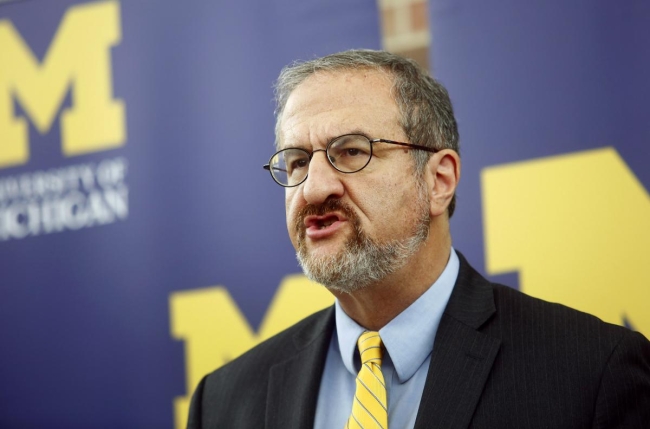You have /5 articles left.
Sign up for a free account or log in.

University of Michigan president Dr. Mark Schlissel
Joshua Lott/Stringer/Getty Images Sport/Getty Images North America
University of Michigan president Dr. Mark S. Schlissel announced Tuesday he would step down from the presidency in June 2023, a year earlier than the end of his previously announced term.
Schlissel’s announcement came slightly more than a year after faculty members narrowly voted no confidence in his leadership and amid recent tensions between him and faculty members, as well as the university’s Board of Regents.
On Monday, the Faculty Senate began voting on a series of resolutions critical of his administration’s leadership on COVID-19 and sexual misconduct.
The Detroit Free Press reported last month that the tensions between Schlissel and the board members may have reached “a boiling point,” fueled in part by unhappiness with Schlissel’s handling of the case of former provost Martin Philbert, who was found to have been elevated to the position as Michigan’s chief academic officer despite what an independent investigation found to be a two-decade-long history of sexual misconduct allegations.
The Free Press reported Tuesday that Schlissel signed a contract with board members on Sept. 23 in which he was promised his full $927,000 presidential salary for at least two years following his planned resignation date. He will initially serve as a special adviser to a new president, with an option to subsequently return to the faculty as a tenured professor at no less than 50 percent of his presidential salary.
Among other details of the deal, as reported by the Free Press, the university promised Schlissel, a medical doctor, a fully equipped lab and $2 million in start-up funds for the lab, as well as an office, an administrative assistant, a campus parking spot and a $36,000-per-year expense fund.
In a universitywide message announcing his plans to step down, Schlissel, who is in the eighth year of his presidency, did not give a specific reason for his decision. He said only that it is “an important time to strategically consider the future for our university.”
“We are emerging from an historic global pandemic and adjusting to new and still evolving ways of working, learning and living, both as individuals and as a university,” Schlissel wrote. “We’re planning our next fundraising campaign and developing the longer-term strategies that will continue to drive our academic excellence and enhance our societal impact. And we’re working on our campus culture and climate to help us to live up to our highest ideals. Each of these important priorities will require commitment and leadership that extends into the next decade and beyond.”
Jordan Acker, chair of the Board of Regents, said in a statement he appreciated Schlissel’s leadership.
“As the president indicated, in due course the board will come together to discuss how we will consult our community, think about the future and thoroughly plan a search for the next leader of the university,” Acker said in a statement quoted in The University Record, an internal University of Michigan publication.
Another regent, Mark Bernstein, credited Schlissel for accomplishments including “his commitment to carbon neutrality” and his championing of the Go Blue Guarantee. The latter program, launched in 2018, offers free tuition for up to four years for full-time, in-state undergraduate students who meet certain academic criteria and have family incomes of $65,000 or under and assets below $50,000.
Michigan’s faculty is divided in its support for Schlissel. The September 2020 no-confidence vote in his leadership passed by just four votes, 957 to 953, with 184 abstaining. The motion raised grave concerns about the safety of Michigan’s reopening plans in fall 2020, when it planned for less COVID-19 testing than some peer institutions. The resulting outbreaks on campus were the subject of a November 2020 article in The New York Times.
The no-confidence motion also quoted the independent investigation into Philbert’s conduct, faulting Schlissel for his failure “to properly and effectively address reports of Martin Philbert’s misconduct despite the university receiving information ‘various times over the course of more than 15 years, including during key periods when he was under consideration and later selected for senior positions within the university.’”
The report by the law firm WilmerHale says investigators found no evidence that Schlissel knew of Philbert’s reported misconduct in advance of his selection as provost in 2017, though it says Schlissel was made aware of a lawsuit involving sexual misconduct allegations against Philbert after his selection but before he began his term as provost.
The report found that Philbert’s misconduct continued when he was provost and that he made sexual comments toward women who worked in the office of the dean of the School of Public Health and in the provost’s office, and that he engaged in sexual relationships with university employees.
"For nearly his entire tenure as Provost, he was in simultaneous sexual relationships with at least two University employees, sometimes more," the report found. "He pressed some of these women to send him explicit photos, which he stored on his University-owned devices. And he engaged in sexual contact with them in University offices, including with one woman on a near-daily basis for a time."
Michigan reached a $9.25 million settlement last November with women who said they were victims of abuse by Philbert.
In July, the university announced what Schlissel described as "sweeping changes" to how it addresses sexual misconduct. Schlissel outlined some of these changes in remarks to the Faculty Senate on Monday, saying the changes were a result of wide consultation across campus, including with survivors.
He also described a consistent downward trend in COVID cases on campuses this fall, after a peak of 160 student cases at the beginning of the semester. The university announced a vaccine mandate in July, and Schlissel said about 96 percent of students are fully vaccinated.
Schlissel’s comments to the Faculty Senate on Monday came as faculty members were set to begin voting on five motions critical of the university administration’s policies on sexual misconduct and COVID-19.
Of the four COVID-related motions, one calls for increased testing, while the other three deal in various ways with flexibility for remote teaching. One motion faults the university’s Work Connections unit for rejecting requests to teach remotely from faculty who have a medically documented need to do so, another motion asserts a faculty right to choose the modality of their classes and one asks for flexibility for faculty and staff to teach and work online if their children cannot attend school in person.
Rebekah Modrak, the sponsor of a fifth motion on sexual misconduct, said all five motions speak to "larger safety issues at the university and feeling the lack of protection and lack of accountability to ensure that we’re safe and that staff and students are safe. I think they’re all related to a sense of vulnerability on this campus and the administration’s disregard for our safety."
Modrak said that upon hearing of Schlissel's plans to step down early, she "was initially relieved thinking that the regents were finally acknowledging failures in leadership." But then she read about the terms of Schlissel's agreement with the board detailing his postpresidential compensation and perks.
"The most concerning part of this, aside from a public institution offering such riches, is that President Schlissel will advise the new president for the first year," Modrak said. "Many of us had hoped that President Schlissel's departure was the opportunity for a new culture of integrity and partnership. But this agreement smells more of royal succession."








